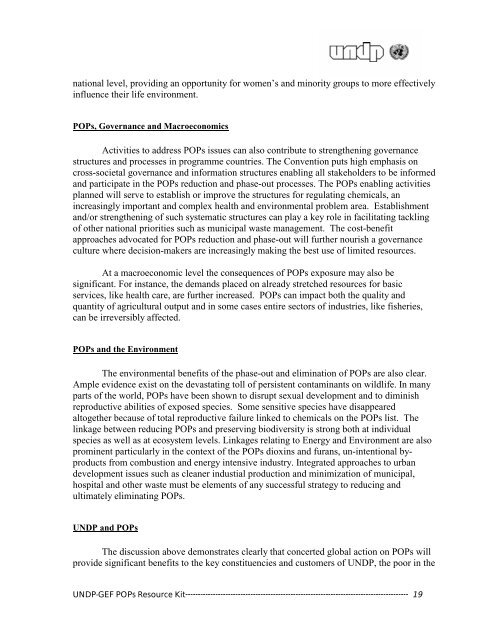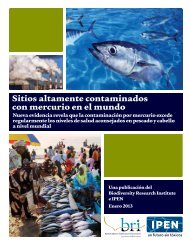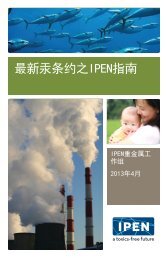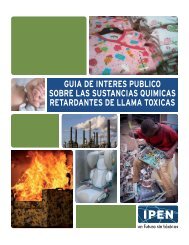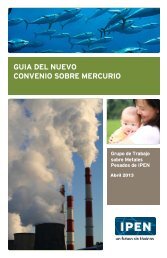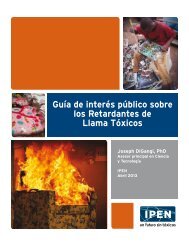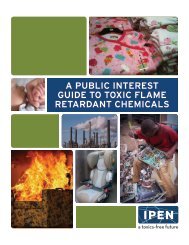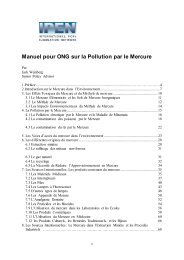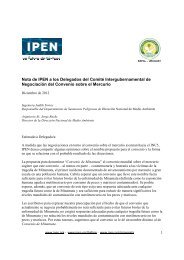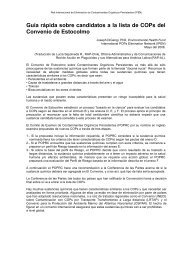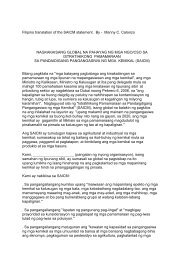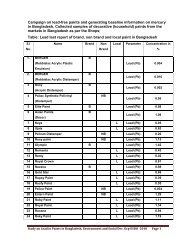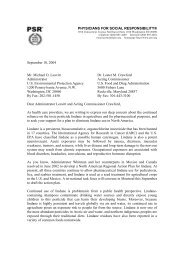The UNDP-GEF POPs Resource Kit - International POPs Elimination ...
The UNDP-GEF POPs Resource Kit - International POPs Elimination ...
The UNDP-GEF POPs Resource Kit - International POPs Elimination ...
You also want an ePaper? Increase the reach of your titles
YUMPU automatically turns print PDFs into web optimized ePapers that Google loves.
national level, providing an opportunity for women’s and minority groups to more effectively<br />
influence their life environment.<br />
<strong>POPs</strong>, Governance and Macroeconomics<br />
Activities to address <strong>POPs</strong> issues can also contribute to strengthening governance<br />
structures and processes in programme countries. <strong>The</strong> Convention puts high emphasis on<br />
cross-societal governance and information structures enabling all stakeholders to be informed<br />
and participate in the <strong>POPs</strong> reduction and phase-out processes. <strong>The</strong> <strong>POPs</strong> enabling activities<br />
planned will serve to establish or improve the structures for regulating chemicals, an<br />
increasingly important and complex health and environmental problem area. Establishment<br />
and/or strengthening of such systematic structures can play a key role in facilitating tackling<br />
of other national priorities such as municipal waste management. <strong>The</strong> cost-benefit<br />
approaches advocated for <strong>POPs</strong> reduction and phase-out will further nourish a governance<br />
culture where decision-makers are increasingly making the best use of limited resources.<br />
At a macroeconomic level the consequences of <strong>POPs</strong> exposure may also be<br />
significant. For instance, the demands placed on already stretched resources for basic<br />
services, like health care, are further increased. <strong>POPs</strong> can impact both the quality and<br />
quantity of agricultural output and in some cases entire sectors of industries, like fisheries,<br />
can be irreversibly affected.<br />
<strong>POPs</strong> and the Environment<br />
<strong>The</strong> environmental benefits of the phase-out and elimination of <strong>POPs</strong> are also clear.<br />
Ample evidence exist on the devastating toll of persistent contaminants on wildlife. In many<br />
parts of the world, <strong>POPs</strong> have been shown to disrupt sexual development and to diminish<br />
reproductive abilities of exposed species. Some sensitive species have disappeared<br />
altogether because of total reproductive failure linked to chemicals on the <strong>POPs</strong> list. <strong>The</strong><br />
linkage between reducing <strong>POPs</strong> and preserving biodiversity is strong both at individual<br />
species as well as at ecosystem levels. Linkages relating to Energy and Environment are also<br />
prominent particularly in the context of the <strong>POPs</strong> dioxins and furans, un-intentional byproducts<br />
from combustion and energy intensive industry. Integrated approaches to urban<br />
development issues such as cleaner industial production and minimization of municipal,<br />
hospital and other waste must be elements of any successful strategy to reducing and<br />
ultimately eliminating <strong>POPs</strong>.<br />
<strong>UNDP</strong> and <strong>POPs</strong><br />
<strong>The</strong> discussion above demonstrates clearly that concerted global action on <strong>POPs</strong> will<br />
provide significant benefits to the key constituencies and customers of <strong>UNDP</strong>, the poor in the<br />
<strong>UNDP</strong>-<strong>GEF</strong> <strong>POPs</strong> <strong>Resource</strong> <strong>Kit</strong>----------------------------------------------------------------------------------------- 19


